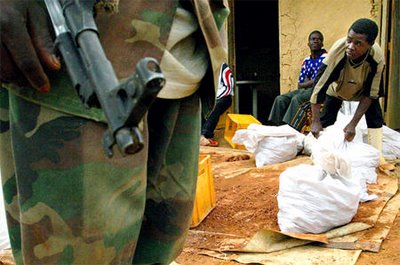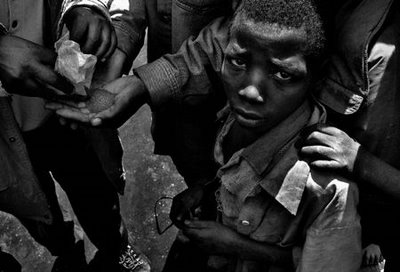
A childs working in a Diamond Mine in Siera Leone.
Africa has been a theatre of war since the colonial struggles and worse off in the post colonial era . The spectacle of armed violence has been witnessed by the unarmed women and children who sometimes have been used as weapons of war. In some of the conflicts witnessed in recent history like in Liberia, Siera Leone, Rwanda, Burundi, Northern Uganda, Sudan, DR.Congo, women have been raped as a weapon of war. Child soldiers have been part of the military machines built for Africa to fight Africa and destroy Africa. Darfur in Sudan today is a society going through what many observers call the other "quiet" genocide of our time. The African Union mobilized troops to stop the conflict but found a more complicated situation of more determined beligerents of which the state is part. We have watched on as we fight each other despite our enormous duty to establish and preserve peace for the prosperity of our people.

A soldier on guard on Kisangani, DR.Congo.
The government in Khartoum mandated to protect the great people of Sudan is more concerned about self-preservation than the people its supposed to protect. It is part of this inhillation policy of the black people in Darfur using its well armed wing of Arabs called Janjaweeds that saw Southern Sudan on a fireball for two decades of destruction. Like in Siera Leone when Fodeh Sankoh dehumanized the entire country, like in Liberia when Sgt.Doe, Charles Taylor and Prince Yormie Johnson and their armies ravaged communities with their quest for power, it all turns out that these are men and women with a western education. Men and women expected to know our strategic threats and realities as continent. The fundamental question is why we fail to work in unity as a people.
To a keen observer, Africa is seemingly in a constant state of war. Communities are perpetually in a state of alert and fear and this causes unproductivity of communities. States are weak and constantly under threat of collapse. In 1993, Somalia got the last American attention, when U.S. Delta Force commandos and Army Rangers were dropped into its capital city, Mogadishu, to capture two aides of a Somali warlord. The mission was successful, but two Black Hawk helicopters were downed by Somali militia linked to Osama Bin Laden network which the Islamic Courts today are an extension, and in the ensuing firefight, 18 Americans died. Images of an Army Ranger's body being dragged through the streets horrified U.S. households. Soon after, President Clinton abandoned the country, and Somalia was largely forgotten until the 2001 movie "Black Hawk Down" retold the tragic story.Now, Somalia is on the brink of becoming the fourth front in the U.S. war on terror. As in Afghanistan, Iraq and in Lebanon, the U.S. is allied in some way against radical Islamic fundamentalists. The Islamic Courts Union, a growing alliance of Islamic militants, recently routed U.S.-backed warlords and took over Mogadishu. It seeks to oust a transitional federal government, which is supported by the African Union but controls only the town of Baidoa. On the sidelines is the U.S.-backed regime in Ethiopia that is eager to lead the battle against the Islamists, who may have ties to Al Qaeda. A war could quickly spread throughout the Horn of Africa and be as costly in human lives as the Israeli Hezbollah conflict. The collateral damage from all these conflicts does not seem to matter to many of those manning our governments.
Fig.3 A child trapped by war.
In many ways, Somalia, the latest front in the war on terror is the culmination of nearly 30 years of alternating Washington policy blunders and neglect in the Horn of Africa and Sub-Saharan Africa. That history has left the U.S. with few good options in a worsening situation.U.S. missteps in the region date to 1977, when policymakers tacitly — and foolishly — encouraged Somalia to take advantage of political instability in the Ethiopian capital and grab control of Ethiopia's Somali-inhabited Ogaden region. The move backfired when Soviet and Cuban troops rushed in to defend the Marxist regime in Addis Ababa, turning Ethiopia into Moscow's staunchest ally in Africa. In response, Washington armed Mohamed Siad Barre's thugocracy in Somalia. When the Cold War ended, U.S. policy toward Somalia swung from intense engagement to indifference. Aid was cut off, Barre was overthrown and the country began its descent into anarchy.But in 1992, the New York Times published photographs of starving children in Baidoa, and President George H.W. Bush sent U.S. troops into Mogadishu under U.N. auspices to distribute food. It was a noble humanitarian gesture but ultimately misguided. Most experts opposed American intervention in Somalia because they believed that the famine was nearing an end and that the presence of U.S. soldiers would only exacerbate the conflicts among rival clan warlords that stymied relief efforts. Were they right?
But how can real men always wait for external solutions to basic problems that call for just common decency? We can always talk about our differences and with respect and acknowledge we must always have resepctable differences as well as common interests. When do our leaders act in unisom? In battle just to prove machoism and the strength of their neo-colonial backers!

Fig.2 UPDF Hunting for LRA Rebels .
But have we asked ourselves who our enemy is? Have we asked ourselves who our powerful weapons imported from Eastern Europe on borrowed money are decimating? Have we asked ourselves whose communities our machoism is raking? We have borrowed money over the years to build military machines to kill our own people. In some instances State armies have turned against their people to protect corporate interests exploiting our natural resources further degrading our people. The African elite that formed the bulk of our post colonial leadership has over-rated its importance thus the constant attempt the western life style. It has lacked the courage to be humble in the course of duty thus the massive levels of corruption, institutional decay and state collapse. Like our pre-colonial chiefs they have been so gullible to form psuedo-alliances to perpetuate wanton suffering of their people. We rebuke all those leaders who have failed to know they are just temporary dynamics like all of us. They don't know their role fundamentally is to build a better future for men and women who will come after us. That we build a foundation of a strong partnership of our children and the world.